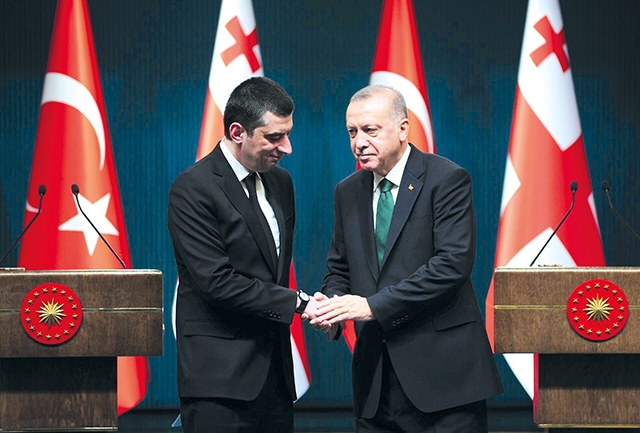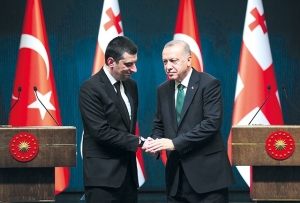Gakharia’s Foreign Trips Underscore the Importance of the Trilateral Format
Since becoming Prime Minister of Georgia in early September 2019, Giorgi Gakharia has paid visits to the neighboring countries. Visits to Turkey and Azerbaijan, though for many seemly ordinary trips, underscore the deep geopolitical interconnection Ankara, Tbilisi and Baku have developed since the early 2010s.
The geopolitical alignment of the three countries first introduced in May 2012 in Batumi (Georgia), was a product of close cooperation between the three states since the break up of the Soviet Union. Back in the 1990s, both Tbilisi and Azerbaijan, having gained independence, tried to balance Russia's influence with larger economic and security cooperation with Turkey. The latter saw avenues for expansion of its influence in the South Caucasus.
Since 2012, the engagement between the three countries has been gradually increasing in defense ties, namely, hosting of joint military exercises and sharing vital military and security intelligence. Moreover, the countries also cooperate on exchange of military staff and military expertise.
Despite occasional misunderstandings between the three states, the Turkish-Georgian-Azerbaijani strategic partnership takes precedence. Military cooperation, although not ambitious enough to cause fears in Moscow, along with railways and pipelines from the Caspian to the Black Sea, represents a far greater sticking point for the countries.
Considering how quickly the regional political and security landscape evolves in the South Caucasus and Black Sea region, the longevity of the trilateral format between Turkey, Georgia and Azerbaijan serves as a basis for regional stability.
The significance of the trilateral format is also underlined by the fact that despite the government change in Georgia in 2012, Turkey's strategic rapprochement with Russia and the generally unstable situation in the region, the format continues to operate. Moreover, the durability of this project is also visible in the fact that the format consists of NATO member Turkey, EU/NATO-oriented Georgia, and Azerbaijan which up until now has avoided joining any large economic or military alliances.
Despite the three countries’ different foreign policy trajectories, the basis for the trilateral cooperation is likely to increase in the coming years. The basis for this that every country of the three needs the others. Turkey, for instance, needs a more stable Georgia with deeper economic and energy cooperation. The Georgian territory also serves for Turkey as a direct land corridor to Azerbaijan. The latter, in light of uncertainties regarding the Nagorno-Karabakh conflict, needs Turkey’s backing in the conflict with Armenia. Georgia, being under pressure from Russia in turn needs both Turkey and Azerbaijan to diversify its foreign policy options. Moreover, the two countries are Tbilisi’s biggest trade partners and investment sources.
From a larger geopolitical perspective, it could be argued that though the three countries do not align because of a common threat, they nevertheless all feel Russian pressure on various fronts from Syria to the Abkhazia and Tskhinvali regions to Nagorno-Karabakh. Even in Azerbaijan, a certain skepticism towards Russia has always existed because of Moscow’s close military relations with Yerevan.
The trilateral cooperation between Turkey, Georgia and Azerbaijan disregards the countries’ different religions, foreign policy trajectories and instead focuses on powerful geopolitical imperatives tying the three states together. For example, one such imperative is the gradual creation of a land corridor connecting the Black and Caspian seas. This is underscored by energy and transport infrastructure which has developed since the end of the Soviet Union in 1991 when various projects such as the Baku-Tbilisi-Ceyhan pipeline and recently Baku-Tbilisi-Kars railway were inaugurated.
Viewed from a Eurasian perspective, the trilateral format of economic cooperation gains further importance if seen within the context of China’s Belt and Road Initiative (BRI). For example, the 826-kilometer Baku-Tbilisi-Kars railway could potentially enable the delivery of cargo between China and Europe in approximately two weeks. According to various estimates, up to 8 million tons of cargo could be carried via the railway by 2025. Indeed, in early November 2019, the Baku-Tbilisi-Kars railway saw the first train coming from China and heading to Europe.
Long-term Perspective
True, it is unlikely that Turkey, Georgia and Azerbaijan will move into a full-scale military alliance, and there will be challenges as to how to commonly deal with geopolitical instability in the South Caucasus. However, the format nevertheless is likely to grow through larger military and economic cooperation. For instance, we could see larger military exercises and discussions on further infrastructural projects connecting the Caspian Sea with the Black.
Georgia will continue to view the trilateral format as a backbone of its regional foreign policy. This will be one of the ways for Tbilisi to balance Russia’s increasing influence in the South Caucasus in an age when the EU is unlikely to expand eastward, talks to improve relations with Russia multiply, and the US’ global posture is still evolving and bringing much uncertainty to the region.
By Emil Avdaliani
The Georgian PM meets with the Turkish leader in October. Image source: hurriyetdailynews.com












